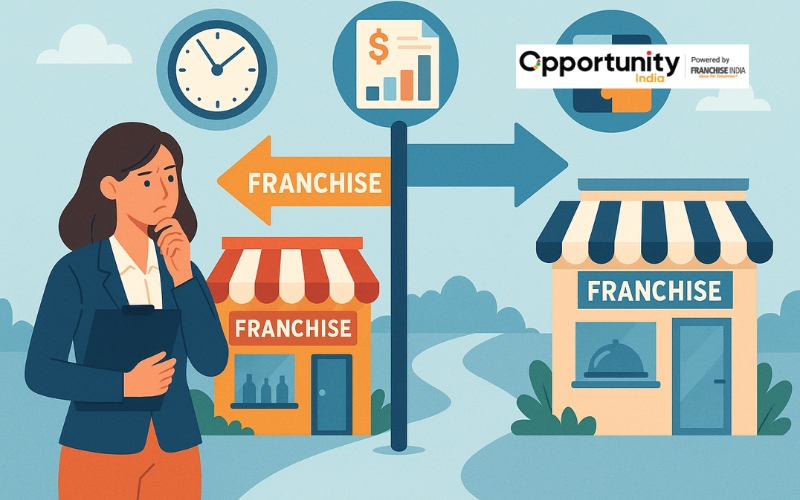
Are you considering purchasing a franchise? Becoming a franchisee is indeed a wise approach to enter the business world. It is an opportunity to start a business with a tried-and-tested recipe, whether it's a well-known coffee chain, fitness brand, or pet grooming service. However, choosing a franchise is not a game of unprofessionalism; you may require certain expertise. However, without a previous background, people tend to overlook a few factors. Today, we're going to examine 7 frequently overlooked factors that you should really consider before signing your franchise contract.
Choosing the Right Franchise: What Really Matters?
One of the most well-liked business startup strategies is franchising, particularly for people who wish to bypass the difficulties of creating a brand from the ground up. It seems perfect on paper—you receive a well-known brand, tested procedures, and continuous assistance. Although there are many benefits to the franchise concept, not everyone is a good fit for every franchise. A lot of new franchisees are so focused on revenues and brand awareness that they overlook important aspects that could make or ruin their business.
Also Read: Should You Start a Franchise After Retirement?
Selecting the ideal franchise can feel like finding a goldmine, which is both full of opportunities and full of undiscovered dangers. The appeal of a tested business plan, a well-established brand, and continuous assistance attracts a lot of aspiring business owners. However, a number of important factors are frequently missed in the rush of finding what seems to be the ideal fit. Ignoring these important factors might result in financial strain, buyer's regret, and eventually franchise failure.

Overlooked Things When Choosing Which Franchise
Your Own Lifestyle and Personality Fit
Let's be honest for a moment: a franchise may not be the best fit for you just because it is profitable. Early mornings, late evenings, or being "on" with clients all the time are requirements of some enterprises. Others may be more organized and behind the scenes.
Consider this:
Do I like talking with others all day?
Can I work on the weekends or holidays?
Would I rather manage a team, or do I want something more hands-on?
Avoid working in customer service if you're an introvert. Beware late-night delivery services if you're a parent who prefers free evenings. The idea is to choose something that complements your way of life rather than something that makes you alter who you are.
The Hidden Costs Nobody Talks About
You'll hear a lot about equipment, beginning expenditures, and franchise fees. However, what about the hidden expenses that surface later?
We’re talking:
Monthly royalty fees
Marketing contributions (even if the ad doesn’t benefit your location)
Tech/software fees
Required upgrades every few years
Some franchisors also require you to purchase from "approved" suppliers, often at costs that make you question whether you're actually purchasing gold-plated napkins. Always find out how much current franchisees actually pay each month. These figures add up quickly, I assure you.
Also Read: 10 Packaging Business Ideas in India
What Current Franchisees Think?
They won't tell you this in the nice brochure, but speaking with someone who is already operating a franchise is the greatest way to understand what it's like.
Find current franchisees and inquire:
"How is headquarters support?"
"If you had the chance, would you invest again?"
"What caught you off guard once you got going?"
These conversations will teach you far more than any sales pitch. Some franchisees will proclaim the virtues of the assistance and training. You may hear terrifying tales from others. In any case, such practical knowledge is invaluable.

Territory Saturation and Market Potential
It's simple to become ecstatic about a franchise brand's success, but widespread appeal frequently carries a hidden risk: market saturation.
Will enough people be visiting and paying attention to your place if the franchisor has already sold a lot of territory close by? Or will you find yourself competing for clients with other franchisees of the same brand?
Furthermore, a franchise's success in one city does not guarantee that it will be successful in another. Location-specific differences exist in demand, culture, competition, and demographics.
Before buying:
- Examine the competition, income levels, and population in your territory.
- Recognize your rights to exclusivity.
- Obtain performance information from comparable regions rather than simply the top 10%.
- Having a decent territory is essential. In the wrong place, even the greatest brand might do poorly.
Franchise Training and Support Quality
"Ongoing support" and "extensive training" are frequently highlighted in franchise brochures, but what does that mean in real life?
Ask detailed questions:
Where is the first training held, and how long does it last?
Does instruction include theoretical content or real-world situations?
What kind of post-launch support is offered, such as weekly check-ins, marketing assistance, or operational direction?
Some franchises provide outstanding support, including field managers, committed trainers, and 24/7 help. After the first several months, others leave you largely on your own.
Exit Strategy and Resale Restrictions
When they are first starting, nobody likes thinking about their exit strategy. However, things happen in life—people relocate, priorities shift, or ventures fail. Knowing your exit strategy is, therefore, essential before purchasing a franchise.
When it comes to selling your franchise, several franchisors have strict regulations:
Some demand that you only sell to authorized purchasers.
Others impose excessive transfer costs.
Some can even flatly refuse to extend your franchise term.
Ask:
If things don't work out, how simple is it to leave the franchise?
Is ownership transferable?
What costs and requirements come with reselling?
A franchise should provide you with flexibility rather than forcing you into an unbreakable long-term contract.
Is the Brand Still Growing—or Fading Out?
A brand that is powerful now might not be in the future. Franchises that lack creativity tend to lag when industries and consumer tastes change. It's simple to become engrossed in a well-known property, but remember to keep your eyes on the wider picture. A brand that is popular now can become outdated tomorrow.
Investigate a bit:
Are they introducing novel goods or services?
Are they adjusting to the latest trends, such as digital payments, sustainability, and healthy choices?
Is there an increase in franchisees from year to year?
A brand that has peaked and is currently sailing is not one you want to invest in. Seek out franchises that are adaptable to changing technology and customer trends.
For example, a fast-food chain that hasn't changed its menu in ten years would find it difficult to compete in a market where customers are choosing locally produced, healthier options. Retail brands are also at risk in an increasingly digital environment if they disregard e-commerce.
Think about the industry's prospects as a whole as well. Over the decade that follows, it is anticipated that certain industries, such as senior services, pet care, and health and wellness, will expand quickly. Others, such as conventional retail, can encounter difficult obstacles.
Wrapping Up
Franchise purchases are significant decisions. It's empowering, exhilarating, and full of possibilities. However, it also requires a commitment of time, effort, and mental capacity in addition to financial resources. Don't let aggressive claims, celebrity endorsements, or logos fool you. Examine the undercarriage. Make the uncomfortable inquiries. Obtain two or three different opinions.

